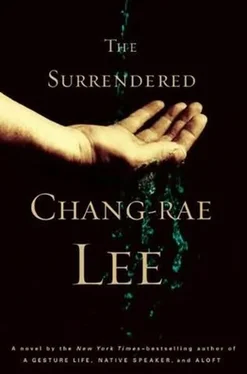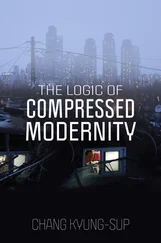“Well, look at this,” he said, picking them up. He inspected the jerky, and the labels. “Where did you get this?”
She didn’t answer.
“What are you, some kind of whore for the foreigners? This is American food.”
“Please, I just found those.”
“What did you do for them, to get such a present?”
“Nothing. I never did anything. Please, I’m telling the truth!”
“Sure you are.”
“Let’s see what else she has,” the other one said.
There was nothing else, this was obvious, but the soldier undid her anyway, with a horrid, meticulous patience. Soon she was completely bare on top, her breasts as pale as milk. She tried to cover herself but he had her keep her arms high, and all she could do was hide her face in the nooks of her elbows as she sobbed.
“Now there’s some sweet fruit,” the other soldier said.
“She’s mine,” the opossum-eyed soldier told him, now grabbing her by the arm.
“Maybe yours first!”
She seemed to lose control of her legs and they practically had to carry her up to the road, where they flagged down a covered truck. The soldiers quickly came to some agreement with the driver, who motioned to the rear. Very few of the soldiers were lucky enough to ride in vehicles. But as they dragged her to the back, Hee-Sung began to resist, her feet digging at the dirt road. The soldier lifted her and slung her over his shoulder and took her to the rear of the truck. She was pummeling his back, kicking her legs. His partner jumped up inside and he handed her to him, and then got in himself. He shouted to the driver but the truck didn’t move; it had stalled while idling. The driver turned over the engine several times before it caught. It was then that her mother, who’d scrabbled frantically up the embankment, reached it, and as it began to roll away she held on to the tailgate, suspended on its edge, Hee-Sung screaming from inside, Uhm-ma! Uhm-ma! , her mother screaming, Hee-Sung-ah! June was wailing, too, as were the twins, who stood frozen beside her, but she couldn’t hear herself for the terrible shrieking, their cries as sharp as if they were being flayed alive.
But it was another sound that overwhelmed them: the roar of two silvery jet planes flashing by overhead. The planes flew in low, shaking the ground as they instantly spanned the length of the valley, then careened far in the distance in a long, banking ascent. They disappeared almost completely, but then June could see they were arcing back. Suddenly the column of soldiers and refugees broke up and dispersed. People sprinted for the fields. The truck had sped up for a distance but now stopped and June’s mother climbed aboard while the two soldiers and a couple of others leaped out. But Hee-Sung and her mother did not. They were embracing, kissing, clothing each other in their arms, before the terrible onrush of sound and light.
When June opened her eyes the truck was gone. There had been a thunderous explosion; June and the twins had been knocked over by the force of the blast. There was an intense pressure in her ears and for several minutes she could not hear her own breathing. The planes had made only the one pass, firing a few rockets, and then flown away. She’d instinctively crouched over her siblings, and when she stood and looked back at the spot there was nothing but a burning half-chassis. She ordered her brother and sister to stay put and she ran there, in perfect silence, her heart feeling like it would burst out of her chest.
The rest of the truck was in small pieces, its parts on the road and blown for dozens of meters on either side. The section in flames lay at the rim of a blackened crater in the road that the explosion had dug two meters deep and many times as wide. But there was little else about. Later she would hear one of the soldiers say that the truck had been heavily loaded with munitions, and that one of the rockets had directly struck the covered bed of the truck. She searched the field below the road and saw the rent bodies of two soldiers on the periphery; the one with the pinched eyes had a large, jagged plate of metal lodged in his neck, his blood staining the ground in a small black patch. The other body was headless, but otherwise untouched. And she was ready for the most horrid discovery. But as long as she looked, circling back and forth, she could not find a single sign of her mother or sister. There was not a scrap of their clothing, not a lock of their hair. It was as if they had kited up into the sky, become the last wisps of the jet trails now diffusing with a southerly breeze, disappearing fast above her.
THE TRAIN HAD SETTLED into a steady pace, moving through the flat of the darkened valley at the speed of a fast horse trot, the locomotive’s rhythm and the radiant warmth of her siblings’ bodies finally ushering June into a state of virtual sleep. It was not wholly sleep because she did not yet dream-she never quite dreamed anymore. Instead, her mind rode alongside itself in a state of animal vigilance, such that she could see the three of them nested in the dull gray wrap of the blanket, their heads and feet tucked inside so that it looked like some huge spider’s or moth’s downy egg sac affixed on the boxcar, placed so that it might travel freely and survive. These last of their kind. If there were any purposeful thoughts bracing her now they simply marked the distances they were covering, the meter of the wheels upon the rails, the shriek of the turns, and the idea that if they could keep moving like this it would be their best chance of remaining together, staying sound. Her one resolve, just before falling sleep, was that they should stay on this train for as long as it would go, for as far as it might take them. There was almost no prospect of getting food on the train, as there would be at some camp; it was difficult to steal or beg anything inside the cars and all but impossible on top. But they were ground down by the road, and she calculated it might be worth eating nothing at all if they could stay cocooned like this and reach Pusan in the next couple of days. If she could administer a potion to make them sleep right through and so blunt the pangs in their bellies she would do so even if it meant them sliding dangerously close to death. For in every village there was a purveyor of herbal medicines who made teas for sleep-even the deepest sleep, if one wished, for the pained and dying.
But what would June in fact do if she had some of that tea now? She would not be afraid that they might drink too much. Maybe she would even steal some sugar or honey to make the drink delicious and sweet, have them gulp it and then lay them down just like this, clinging to her belly like they were her own children, and tell them a colorful story about the grand meal they’d soon enjoy with their cousins. She would give her life for them, but she had begun to understand that the other face of that will was that she could allow them to suffer only so much. They were in a grave condition. Their cheekbones, like her own, were sharply drawn now and jutting, but their bellies were unnaturally distended, the skin drum-tight and shiny. Ji-Young’s hair was beginning to fall out and Hee-Soo had a weeping rash on her back that was festering as it spread. Both of them were listless, dull-eyed, growing quieter by the hour, and they’d even ceased to wonder about their mother and sister; after the attack by the planes they’d asked constantly about where they might have gone, as June had told them their truck had sped off before the planes swooped in and that they would make their way to Pusan soon, if they weren’t there already. But in the last few days neither mentioned Hee-Sung or their mother, as if the privation had clarified their minds as much as their bodies, rendered away all infantile hope and wish and belief to leave only the unmysterious, the unmistakable, the real.
Читать дальше











